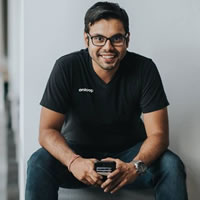Projjal Ghatak Podcast Transcript
Projjal Ghatak joins host Brian Thomas on The Digital Executive Podcast.
Welcome to Coruzant Technologies, Home of The Digital Executive Podcast.
Brian Thomas: Welcome to The Digital Executive. Today’s guest is Projjal Ghatak. Projjal Ghatak founded OnLoop in 2020 to create a category called collaborative team development to fundamentally reinvent how hybrid teams are assessed and developed.
This was after over a decade of frustration with clunky, traditional enterprise performance management and learning processes and tools that were either hated or ignored by his teams at companies like Uber and Accenture where he spent many years. He has now dedicated his lifelong mission of unleashing the full potential of the world’s 1 billion knowledge workers.
Prior to founding OnLoop, Projjal spent three and a half years at Uber in a variety of roles, including leading strategy and operations for business development globally, leading strategy and planning for APAC Rides Business and GM of the Philippines Rides Business. Besides Uber, he also spent some time raising debt and equity from New York hedge funds for an industrial conglomerate in strategy consulting in Southeast Asia with Accenture and in early-stage companies in Latin America with Blue Kite and L Market prior to that. Somewhere, along the way, he spent two years at Stanford getting an MBA.
Well, good afternoon, Projjal. Welcome to the show!
Projjal Ghatak: Thanks, Brian. Thank you for having me.
Brian Thomas: Absolutely. And really, it’s, it’s evening there in Singapore. So, I appreciate you traversing this virtual globe when we do these podcasts. So certainly, appreciate it.
And Projjal jumping in to your first question here. What motivated you to create on loop and develop the concept of collaborative team development? How does it different differ fundamentally from traditional performance management systems?
Projjal Ghatak: Yeah. So, OnLoop was born entirely from personal pain. And so right before starting on loop, I’d spent three and a half years at Uber.
I joined the company in 2016 when we were 9,000 people and we were 27,000 people. By the time I left towards the end of 2019. And throughout my whole tenure you know, having sort of, first, I was individual contributor. And then when I left. I was effectively global CEO for our division off about 120 odd folks.
And through the whole time, I felt like we just didn’t have the right approach and the right tools and products to help managers sort of run a very effective team. And so, I saw things like Slack and Trello and Asana and Notion and Zoom, really sort of revolutionize how people got work done and how people sort of collaborate and communicate it.
But things like goals and feedback, things like skills development things like sort of managing motivation energy. Sort of, because they have traditionally been seen as quote unquote HR. Functions, they ended up sort of being implemented through very, very funky sort of H. R. Tech. And we saw the I.
T. industry revolutionized when engineering and designers left I. T. and started building tools for the end user. And we’re sort of a product built for managers by managers to help managers get the most out of the teams.
Brian Thomas: That’s amazing. And it’s interesting, you know, we always find a problem and like, how do we solve this?
And yeah, it sits in HR. How am I going to do that? So, I appreciate the backstory. I really do. Very helpful to kind of talk more in depth about, you your platform that you created. So Projjal, hybrid teams face unique challenges in maintaining productivity and cohesion. Can you elaborate on how OnLoop’s platform addresses these challenges and supports hybrid and remote teams effectively?
Projjal Ghatak: Yeah, look, I, I think, you know, people have operated in Distributed teams and technology for a long time. So, when I was at uber. I used to be on zoom calls all day with various possible wall, right? It just happened. So that pre-pandemic was an office setting. And now that happens more in a home setting or in Bali or an office setting.
So, so really sort of the nature of the collaboration hasn’t changed, but the. Place where it’s happening from has changed and in many cases now. You have managers who are managing teams that may be distributed remote, but they don’t get to see the people every day. And actually, I was with a bunch of managers.
From a company called stash away in Singapore, which is sort of a successful robot advisory firm. And 1 of the things that we kept coming back to was just how intentional. Managers need to be to effectively manage in a hybrid team and that means. Having a very clear framework and a very clear approach.
On how to drive productivity. In your organization. Versus sort of letting, it happen more serendipitously. Which is what managers sort of relied on in a pre-pandemic world and what we do with the CTD approach and then sort of the product that, that sort of accompanies it is, is make sure that managers really understand.
What is the hierarchy of needs that each team member has and then how to intentionally drive the right interventions either on a daily basis or on one on ones on a weekly basis or on more monthly or quarterly cadences to get the most out of the teams. But I think the key sort of word here is intentionality and being very, very intentional on how you go about things which is super required.
When people are operating in a hybrid or remote environment.
Brian Thomas: Thank you, I appreciate that. You know, it is kind of a struggle. I think we’ve all learned over the last 3 years how the pandemic has really affected how we work. It’s totally disrupted business across the globe, as you know. And I appreciate you focusing on this particular challenge that we all have today because we are now officially a hybrid environment.
So, thank you. And Projjal, establishing a culture of continuous feedback is central to OnLoop’s mission. What are some of the best practices for giving and receiving feedback in a way that promotes professional growth and team development?
Projjal Ghatak: Yeah, you know, and again, we do a lot of work with our customers sort of educating them on feedback.
And listen, people have been talking about how important feedback is for decades, right? Like we weren’t the first company by any stretch to sort of really. Sort of stress how important feedback is. However, I, I think what is different this time around is the power of large language models, generative ai, applied ai to sort of effectively augment what humans are good at and then sort of complement what machines are good at.
And, and what I tell people is that humans actually suck at cons at structuring feedback. And all effective feedback is direct and kind. It is devoid of emotion and it is very much focused on inspiring the receiver of the feedback to sort of have behavioral change. And what sort of comes in the way often is sort of the triggers and frustrations for the person who’s giving the feedback or in some cases sort of the awkwardness around it.
And so, what we do with our product is, we let people sort of share privately on the platform, sort of their unstructured observations, either themselves on themselves or someone on the team. And then we were able to leverage large language models to break down that observation into specific pieces of.
What we call celebrate feedback to recognize something going well or improve feedback on providing guidance on something that would go better rewriting that in a format that is direct and kind sort of following a situation, behavior impact, or SBI framework of how to do feedback and then also extracting skills, competencies, behaviors, values whatever the organization wants to call them that might be embedded in that feedback.
And through that process we’re then able to sort of make a really frictionless act by of sharing an observation and then structure that into insights and feedback that is valuable for human growth. Now, we also, you know, do feedback training for companies, but we actually think that feedback training has been tried and tested for decades and has been completely ineffective and driving behavior change.
But giving people the right aid that lets them stick to their natural behavior, which is making observations and then using technology to structure and extract insights. We believe is the way to go to build and foster feedback cultures in companies.
Brian Thomas: That’s amazing. And, you know, there, there’s a statistic out there, especially for supervisors, managers, leaders.
You know, they were thrown into that role without any training. And I think that the number is pretty high, like it’s like five years before they receive any training after being in the role. It’s like 68% something. And having a tool like this would absolutely help provide the new leader or leader some insights to help navigate that conversation.
Cause you know, sometimes those conversations can be difficult or awkward and I really do appreciate what you’re doing to help close this gap and make it a better work environment. So, thank you. And Projjal, as AI and VR continue to evolve, how do you envision the future of work, particularly in terms of team collaboration and development, and what role will OnLoop play in shaping this future?
Projjal Ghatak: No, you know, thank you for asking that. And frankly I could not be more excited about sort of the seismic shifts that are taking place in the future of work. And, and the opportunity for businesses globally to sort of really reinvent their operating models to take advantage of what I see as three large ships one, which obviously we’ve touched on which is the move to hybrid and remote work and sort of really building what, what more people are calling is a borderless.
Workforce globally. Obviously, we’ve had sort of, you know, waves of outsourcing and offshoring and that’s not a new concept. But I think people start operating less in an in-office setting and more in a hybrid setting. That even further accelerates that movement. The 2nd, obviously, is the ubiquity of applied at work.
You know, 75 percent of people have already used. Some applied to all typically chat for work reasons. In the last 6 months, and I think that number is going to get close to 100 percent for knowledge workers in the next. Sort of couple of years, and then the 3rd, which you just touched on, which is less spoken about.
And is the notion of immersive PR so ability for us to put on a helmet and almost be transported into a different world where we really feel like we’re together with our colleagues, but we might be in in many different parts of the world. And that is massive implications for businesses as well as sort of.
Talent around the world. And we very much see our job as a company to help businesses achieve optimal productivity from their people taking advantage of all of the shift that are taking place in this new world. And so with us and to our partners that we work with we really think we can help businesses sort of both assemble and then manage.
The most optimal version of their workforce on a global basis and really sort of drive. Sort of a I led workforce transformation and you know, that’s what that’s what keeps me going. And it’s something I want to keep doing for a very long time.
Brian Thomas: That’s awesome. Again, you’re out there trying to help humanity bridge this gap overcome some of the obstacles in the, you know, leader employee relation management really there’s just a lot to it.
And as you know, if we can enhance or improve that, even using technology. We’ll make, be a game changer for sure. So, thank you for sharing and Projjal, it was such a pleasure having you on today. And I look forward to speaking with you real soon.
Projjal Ghatak: No, thank you. And thank you for your questions and, you know, I encourage anyone in your audience to, to reach out and, you know, share your thoughts and reflections.
I read everything that comes through my mailbox. And so, I, I highly encourage folks to reach out. Thank you again.
Brian Thomas: Bye for now.
Projjal Ghatak Podcast Transcript. Listen to the audio on the guest’s podcast page.











